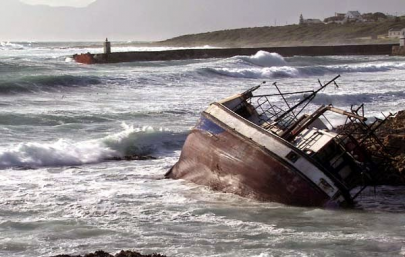Life Saving
Friday, November 24, 2023
Dear Pastors
Life Saving

If you are anything like me you will be thinking about the year ahead. Your 2024 diary or planner is well and truly getting a work over.
As is now widely understood the evangelistic fruit of the church in NZ is at an all time low. Personally I wouldn’t be surprised in the least if somewhere in the 30-40% of churches in NZ have not seen even one conversion or baptism this year or perhaps in many years. The waters are still.
Yet so many people are so terribly lost. Thousands are drowning in despair and depression. They need churches that see themselves as ‘Life Saving Stations’.
In this parable, there is a moment when what was a lifesaving station turns into a Club. From there forward, the primary reason for joining that club was the benefit of membership. Previously, the primary motivation was that of serving the souls who normally would have been lost to shipwreck on that rocky seacoast.
“On a dangerous seacoast where shipwrecks often occur, there was once a little life-saving station. The building was primitive, and there was just one boat, but the members of the life-saving station were committed and kept a constant watch over the sea. When a ship went down, they unselfishly went out day or night to save the lost. Because so many lives were saved by that station, it became famous.
Consequently, many people wanted to be associated with the station to give their time, talent, and money to support its important work. New boats were bought, new crews were recruited, a formal training session was offered. As the membership in the life-saving station grew, some of the members became unhappy that the building was so primitive and that the equipment was so outdated. They wanted a better place to welcome the survivors pulled from the sea. So they replaced the emergency cots with beds and put better furniture in the enlarged and newly decorated building.
Now the life-saving station became a popular gathering place for its members. They met regularly and when they did, it was apparent how they loved one another. They greeted each other, hugged each other, and shared with one another the events that had been going on in their lives. The lifesaving motif still prevailed in the club’s decorations, and there was a liturgical lifeboat in the room where the club’s initiations were held. But fewer members were now interested in going to sea on life-saving missions; so they hired lifeboat crews to do this for them.
About this time, a large ship was wrecked off of the coast, and the hired crews brought into the life-saving station boatloads of cold, wet, dirty, sick, and half-drowned people. Some of them had black skin, and some had yellow skin. Some could speak English well, and some could hardly speak it at all. Some were first-class cabin passengers of the ship, and some were the deck hands.
The beautiful meeting place became a place of chaos. The plush carpets got dirty. Some of the exquisite furniture got scratched. So the property committee immediately had a shower built outside the house where the victims of shipwreck could be cleaned up before coming inside.
At the next meeting there was rift in the membership. Most of the members wanted to stop the club’s life-saving activities, for they were unpleasant and a hindrance to the normal fellowship of the members. Other members insisted that life-saving was their primary purpose and pointed out that they were still called a life-saving station. But they were finally voted down and told that if they wanted to save the lives of all those various kinds of people who would be shipwrecked, they could begin their own life-saving station down the coast. And do you know what? That is what they did.
As the years passed, the new station experienced the same changes that had occurred in the old. It evolved into a place to meet regularly for fellowship, for committee meetings, and for special training sessions about their mission, but few went out to the drowning people. The drowning people were no longer welcomed in that new life-saving station. So another life-saving station was founded further down the coast. History continued to repeat itself. And if you visit that seacoast today, you will find a number of adequate meeting places with ample parking and plush carpeting. Shipwrecks still occur in those waters, but now most of the victims are not saved. Every day they drown at sea, and so few seem to care . . . so very few”.
Source: Theodore Wedel, “Ecumenical Review,” October, 1953, paraphrased in Heaven Bound Living, Knofel Stanton, Standard, 1989, pp. 99-101
As you think about 2024 and beyond can I encourage you to sit with this modern day parable for a while. Read it slowly. Pray about it’s insights. Take a long hard look at your own church and ask this simple yet challenging question. Are we as a local church still passionately committed to thinking and behaving ‘like a life saving station’ or have we slipped into a modern day comfortable club mentality? What must I do to move us back to a cutting edge, lean and enthusiastic company of life savers?
Until The Nets Are Full
Alan
